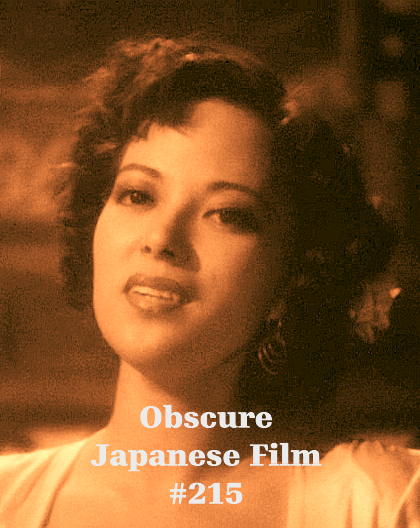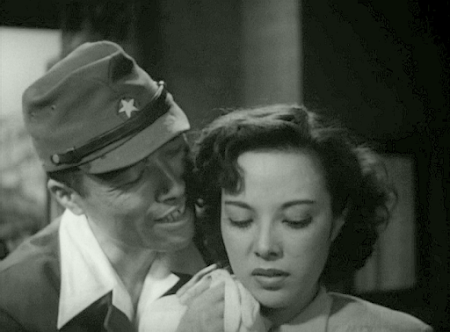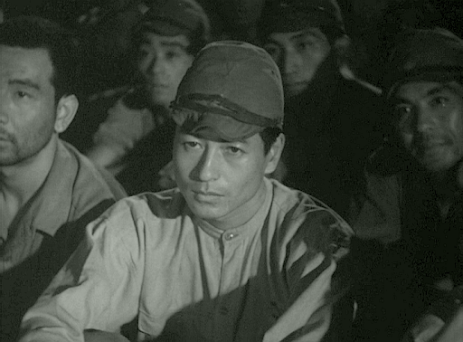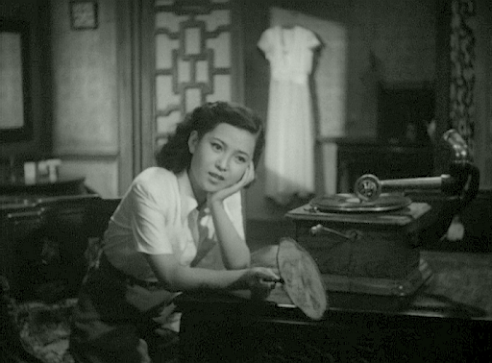Escape at Dawn / 暁の脱走 / Akatsuki no dasso (1950)
 Yoshiko Yamaguchi
Yoshiko Yamaguchi
1945. Harumi (Yoshiko Yamaguchi) is a singer in a troupe of femaleentertainers sent to Manchuria to help the Japanese soldiers forget about theirprobable imminent deaths. Unfortunately, she quickly attracts the attention of overbearingLieutenant Narita (Eitaro Ozawa) and is about to be raped by him when PrivateFirst Class Mikami (Ryo Ikebe) knocks on the door to deliver a trivial telegramto Narita, allowing Harumi to escape. Harumi and Mikami fall in love, but, when he's wounded in battle, circumstances lead to them being captured together by the Chinese. Mikami istreated with nothing but kindness by his captors, but he’s been completelybrainwashed by the Japanese military propaganda machine into thinking that it’sbetter to die than be taken prisoner…
Produced by Shintoho,the company founded by those who split from Toho after the studio’s big labourdispute of 1947, Escape at Dawn wasnevertheless distributed by Toho. Like director Senkichi Taniguchi’s previousfilm, Jakoman and Tetsu, it was alsoproduced by Tomoyuki Tanaka and co-written by Akira Kurosawa. In this case, thesource was a 1947 novel by Taijiro Tamiya (1911-83) entitled Shunpu den (‘The Story of a Prostitute’,not available in English). Tamiya had served in Manchuria during the war (ashad Taniguchi) and also written Nikutaino mon (‘The Gate of Flesh’), first filmed in 1948 by Masahiro Makino andlater by Seijin Suzuki, Hideo Gosha and others.
Although Tamiya is saidto have created the character of Harumi with Yoshiko (later Shirley) Yamaguchi in mind, inthe novel she was a Korean prostitute (or ‘comfort woman’), while it’s madevery clear in the film that she is not a prostitute, and she has also becomeJapanese. Apparently, the original version of the screenplay was faithful tothe novel on these points, but the content of Japanese films was still beingcontrolled by the occupying Americans, who insisted that changes be made. It’shard to see how such whitewashing benefitted the Americans, so their decisionwas presumably just a case of them imposing their own cultural nanny-stateideas of the time about the depiction of ‘immorality’ on screen. An unfortunateknock-on effect was that Harumi’s behaviour in the way she throws herself atMikami and won’t take no for an answer now appeared extremely odd coming from aJapanese singer rather than a Korean prostitute. According to Stuart GalbraithIV in his book The Emperor and The Wolf,Kurosawa eventually got fed up with the requests for endless rewrites and leftTaniguchi to it. He also states that,
…long preproduction,expensive exterior sets, and tangled red tape to secure permission for use ofmilitary hardware for filming (machine guns, etc) made it the most expensiveJapanese feature to that point.
I’ve read elsewherethat it was also the first post-war Japanese film to feature scenes of Japanese soldierson the frontlines. In any case, while it’s certainly a compromised vision, thefilm is at least very well-made and often technically impressive, with cinematographerAkira Mimura winning a Mainichi Film Concours award for his efforts. On theother hand, the essentially simple story of a predictably doomed romance feelsoverstretched at almost two hours. As Lieutenant Narita and his men are stationed in the desert, thefilm is very much like a Japanese Foreign Legion movie, and memories of MarleneDietrich and Gary Cooper in Morocco(1930) are often brought to mind. There are some surprisingly sensual scenes betweenstars Yoshiko Yamaguchi and Ryo Ikebe – at one point, she bites his hand hardenough to draw blood, then sucks the wound, which he seems to enjoy. This wouldhave been considered strong stuff in Japan in 1950 and probably helped at thebox office.
Seijun Suzuki directed a more faithful version of the originalnovel in 1965.
Bonus trivia:
Setsuko Wakayama, whoplays one of Harumi’s colleagues, had married director Senkichi Taniguchi in1949, but they divorced in 1956 when he had an affair with actress Kaoru Yachigusa.This adultery scandal harmed Taniguchi’s career greatly – after directing anaverage of three films a year until 1957, he was subsequently out of work forover two years. When he did return to directing, the quality of the material hewas offered was significantly lower than it had been before the scandal.
DVD at Amazon Japan (no English subtitles)






